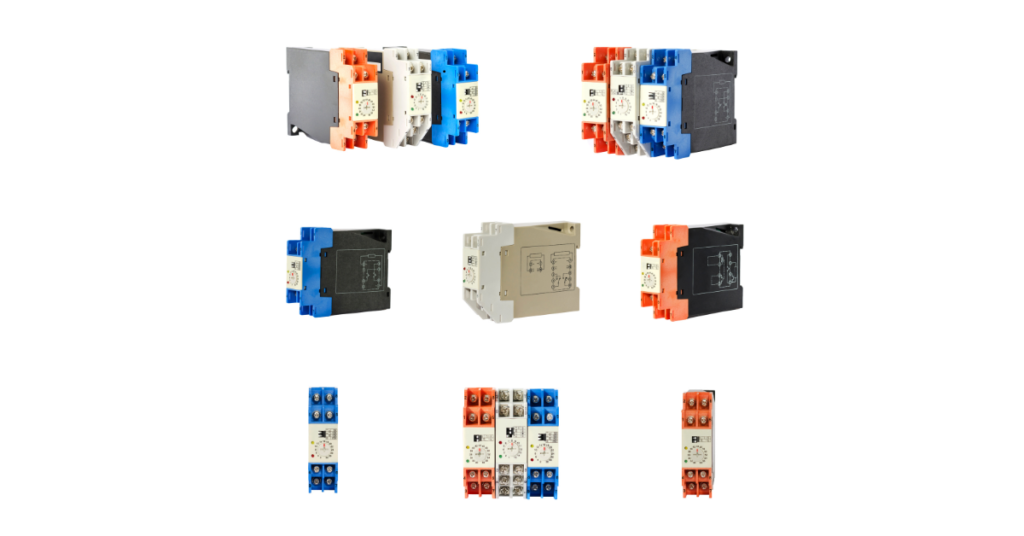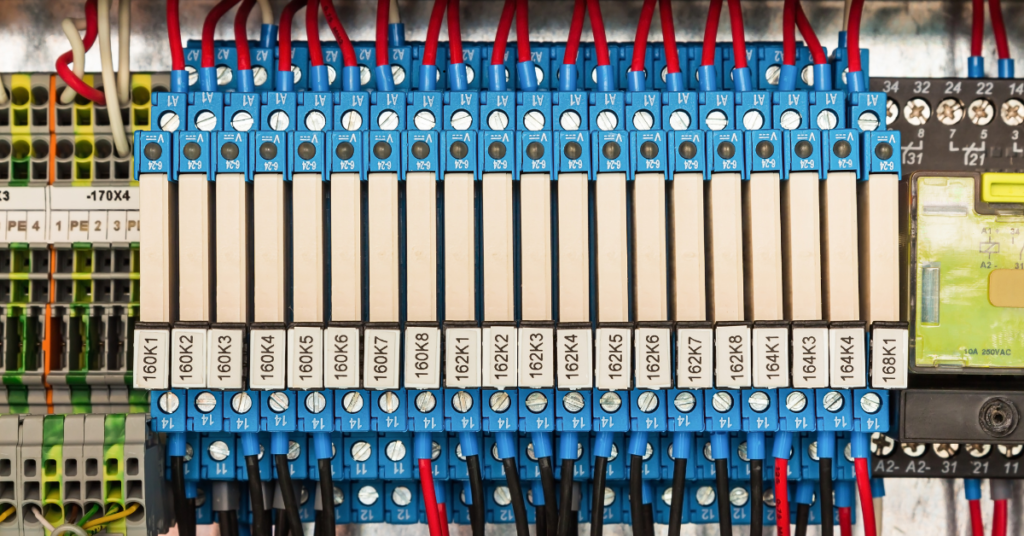Tech
Relays Functions and Applications in Electronics: A Comprehensive Guide
Published
10 months agoon
By
Micheal
Ever struggle to turn on something big with a small button? Relays are the heroes in the background. This article will show you how relays bridge the gap, so you can control big circuits with small signals.
Time to flip the switch!
Highlights
- Relays are powerful switches that let small signals control big circuits. They work by using electromagnets or solid state technology to turn circuits on and off.
- There are different types of relays: Electromechanical Relays (EMRs), Solid State Relays (SSRs), Time Delay Relays, Protective Relays, and High Voltage Relays. Each type has its own job in cars, trains, power systems, and communication equipment.
- New relay technology makes them smarter, more efficient and longer lasting. New developments include flyback diodes for voltage spike protection and better heat management and energy efficiency.
What is a Relay?

A relay is like a superhero switch that can handle big power with just a small signal. It acts as a bridge so low power circuits can control high power ones safely and easily.
Definition and Basic Design
Relays are like magic switches that turn things on and off without human intervention. Imagine a small box that decides when your backyard lights come on or your car’s engine roars to life.
Inside this box is a simple yet clever design: a wire coil wraps around a metal heart called a solenoid. Energy flows through the coil and creates an invisible force field – think of it as a magnet you can switch on and off with electricity.
This magnetic pull moves another piece of metal, making or breaking an electric circuit.
To keep everything running smoothly and protect the relay from voltage spikes – those sneaky electric surges that can cause trouble – flyback diodes come into play. They’re like guardians, quickly dealing with unwanted energy so the relay can do its thing without any hiccups.
Another useful tool in managing these surges is the snubber circuit, so even when power levels jump unexpectedly our little relay remains unfazed and ready to go.
Relay Contact Types
Relays are used in many circuits, with different contacts for different jobs. Let’s get into this.
Here’s a direct presentation of the primary contact types in electrical relays:
| Contact Type | Description | Common Uses |
| Normally Open (NO) | Connects the circuit when the relay is activated. | Used where the circuit needs to be off until triggered. |
| Normally Closed (NC) | Disconnects the circuit when the relay is activated. | Used where the circuit needs to be on until triggered. |
| Mercury-wetted | Uses liquid mercury to form circuits, offering low resistance and reliable operation. | Important in sensitive or high-speed switching applications. |
| High-Power | Uses durable materials like silver and cadmium oxide to handle substantial power levels. | Suitable for industrial and power system applications. |
I had a project once where the relay type was critical. We were building a system that needed minimal electrical resistance and fast switching. We went with standard electromechanical relays first but further investigation revealed the mercury-wetted relay was the way to go. Its low resistance and speed was perfect for our needs. This choice improved our system big time and shows how important it is to understand relay contacts.
Choosing the right relay contact is about efficiency and reliability in your circuit. Whether you’re upgrading a car’s electrical system or developing life critical equipment, knowing these contact types can save you from problems. Each type has its purpose, suited for specific functions, from triggering safety systems to keeping critical processes running uninterrupted. Look into these options for your next project and the answer might be in the details.
Types of Relays

Relays come in different shapes and sizes, each with its special job. From simple gadgets that turn lights on and off to complex devices that manage power in big machines, relays play a key role.
Electromechanical Relays (EMRs)
Electromechanical relays, or EMRs, are like superheroes of the electronics world. They use an electromagnet to either make or break connections in circuits. Imagine lifting a heavy object with ease; similarly, when electricity flows through the relay’s coil, it creates a magnetic field.
This field pulls a lever and either connects or disconnects the circuit. Simple yet powerful! These relays come equipped with springs that help return them to their original position once the current stops.
These gadgets don’t mess around with connection types either. They can have contacts coated in gold for delicate low-voltage tasks or silver for jobs requiring more oomph. And get this – some even use liquid mercury to ensure smooth operations without any wear and tear on the parts when they flip-flop between states.
Whether it’s controlling lights from afar or managing complex machinery, EMRs tackle it all without breaking a sweat.
Solid State Relays (SSRs)
Solid State Relays (SSRs) are like magic switches for electrical circuits but with no moving parts. They use the wonders of semiconductor properties to do their job, flipping on and off at lightning speeds.
These relays don’t wear out quickly because there’s nothing inside them that moves. This means they last a lot longer than their cousin, the electromechanical relay (EMR). Plus, SSRs can switch things on and off much faster than EMRs ever could.
One super cool thing about SSRs is how they stand up to nuclear radiation way better than other semiconductors. It’s like having a superhero switch that keeps working even when things get tough! They’re perfect for all kinds of jobs where you need reliability and speed, from controlling lights with a flicker of electricity to managing powerful machines without breaking a sweat.
With solid-state technology, these relays bring the future of automation into today’s world, making everything from cars to factories run smoother.
Time Delay Relays
Time delay relays operate as the hidden overseers of electrical systems. They patiently await their signal before springing into action, introducing an exact delay before turning on or off.
This pause isn’t arbitrary, but precisely engineered to fulfill timing requirements in industrial automation and sequencing tasks. Envision the process of arranging dominos to topple in order – that’s the job of these relays, managing electrical currents to coincide at the correct instant.
These tools excel in fulfilling both ON-delay and OFF-delay functions, positioning them as key players in scenarios where timing is critical. Time delay relays support machinery operation, promoting smoothness, safety, and efficiency by supervising the intervals between electrical signals.
It’s akin to having an unseen entity directing operations to forestall accidents and streamline processes invisibly. Within the sphere of power devices and control circuits, they’re unrecognized champions making sure everything operates in perfect rhythm.
Protective Relays
Protective relays act like superheroes for electrical circuits. They watch over them, ready to jump into action if an overload or a fault sneaks in. These devices have the important job of opening and closing circuit breakers when they catch something wrong.
Think of them as the guardians of the electrical world, making sure everything runs smoothly and safely.
In modern power systems, these protectors are crucial. They keep an eye on the flow of electricity and send out a signal to shut things down if they detect trouble. This helps prevent damage to machines and keeps our lights on without interruption.
By acting fast, protective relays save the day by preventing minor issues from turning into major problems.
High Voltage Relays
High voltage relays play a crucial role in managing circuits that deal with really strong electric forces. These powerhouses are the muscle behind power transmission and distribution networks, ensuring everything runs smoothly without any hiccups like arcing or overwhelming surges of electricity.
They’re built tough to comply with strict safety and performance benchmarks, making sure they can take on high inrush currents without breaking a sweat.
I once saw these giants up close during a tour of an electrical substation. The guide explained how these relays act as guardians, monitoring flows of electricity with eagle eyes to prevent any dangerous spikes or drops that could lead to disaster.
It’s fascinating stuff – like having a superhero inside your circuitry keeping an eye out for trouble around the clock.
How Relays Work

Relays are like magic switches that use a little bit of power to control a lot more. They work by using electromagnets or electronic methods to turn things on and off without touching them directly.
Operation of Electromechanical Relays
Electromechanical relays act like simple switchers. Imagine flipping a light switch at home. Now, imagine that action happening inside a small box, using electricity instead of your hand.
Inside this box, a coil of wire wraps around a soft iron core to form an electromagnet. When you pass current through this coil, it turns into a magnet and pulls an iron armature toward it.
This armature is connected to contacts made of materials like gold or silver.
This pulling action either makes or breaks the connection with another circuit part depending on the relay’s design—like connecting two pieces in a puzzle or taking one away. If power quits flowing through the coil, a spring snaps the armature back into its original place, breaking the magnetic field and moving the contacts apart again.
From my own tinkering with these components in small electronic projects, I can attest to their simplicity and reliability for controlling larger loads with smaller inputs—it’s like using a tiny pebble to move a big rock!
Functioning of Solid State Relays
Solid State Relays (SSRs) operate differently from their mechanical cousins. SSRs rely on semiconductor properties to manage electrical flow. This means they don’t use any moving parts, leading to a much longer life span for the relay.
Semiconductors in SSRs act like switches that can turn on or off when an external voltage is applied. This makes SSRs incredibly fast at switching, way faster than Electromechanical Relays (EMRs).
Another cool advantage of SSRs is how tough they are against nuclear radiation, making them a solid choice for environments where other electronic devices would fail. Plus, with no parts moving around inside them, they’re not just long-lasting but also super quiet and highly reliable for precision tasks.
Whether it’s controlling lights or managing intricate machinery processes, these relays do it without breaking a sweat—or breaking down.
Applications of Relays
Relays are like the secret agents of electronics, working behind the scenes to control things. They play key roles in cars, trains, power systems, and gadgets we use every day.
In Automotive Systems
Cars use relays to manage the show under the hood. Think of them like backstage managers at a concert, making sure high-power acts like headlights and fuel pumps hit their cues without a hitch.
According to DIN 72552, these automotive switches have specific numbers for their roles. This means they can handle the tough job of switching high currents needed by car components safely.
Safety is top-notch with these devices, adhering strictly to automotive standards for reliability. Imagine having a tiny guardian angel ensuring your ride’s lights and engine run smoothly, guarding against any electrical hiccups that could spoil your journey.
That’s what relays do – they keep things running without missing a beat in cars, making every trip safer and brighter.
For Railway Signaling
Railway signaling relays stand guard on the tracks, not with flashing lights or loud horns, but with silent precision. They’re built tough to handle just about anything trains and nature throw at them.
This backbone of rail safety thrives on switching tiny voltages and currents, making sure trains know when to go and stop. Imagine them as the big burly bouncers of train operations: always alert, ready to spring into action at the first sign of trouble to keep everything running smoothly.
I once had a chance to see these giants up close during a tour of a railway control center. Their size surprised me—they were much larger than any relay I’d seen before. It was clear that their design was all about reliability; after all, thousands of lives depend on them every day.
These protective relays have one job: spotting faults like a detective spots clues and flipping circuit breakers faster than you can blink—an essential duty for keeping our rails safe from disaster.
In Power Systems
In power systems, relays are the unsung heroes keeping everything running smoothly. Protective relays leap into action to guard electrical circuits from getting overwhelmed or short-circuited.
They’re like vigilant sentinels, watching over the flow of electricity with an eagle eye. Without them, we’d face constant blackouts or worse, equipment damage that could take ages to fix.
Managing high voltage isn’t a walk in the park either. High voltage relays step up to this challenge by handling power transmission and distribution like pros. They ensure that surges of electricity don’t wreak havoc but instead move safely across vast networks.
Thanks to these devices, our homes and businesses stay lit up without a hiccup. My own brush with a blackout taught me just how crucial reliable power management is—it’s all smooth sailing until it isn’t!
In Communication Equipment
Relays play a significant role in communication equipment, such as correctly routing your phone calls. Reflect on their origins in telegraph systems, assisting in transmitting messages across distances.
They continue to serve even in today’s complex computer networks for smooth messaging or quick email dispatch.
For instance, coaxial relays are key components in radio systems. They switch antennas enabling clear and uninterrupted reception of your favorite radio voice. Think about those initial computers that appeared to be quite exotic? Relays were behind the scenes, ensuring all those 0s and 1s reached their intended destination, enabling number crunching or gaming without interruption.
Thus, the next time you enjoy streaming music or direct a call to voicemail, attribute it to those compact relay components for maintaining open communication channels.
Selecting the Right Relay
Picking the perfect relay is like choosing the right tool for a job. You have to think about what you’re working with and where it’s going to live. Will it be hot or cold there? Is it for a big task or a small one? And safety – that’s super important too.
Ready to find out more? Let’s get into details!
Considerations Based on Load Type and Capacity
Choosing the right relay hinges on understanding your load’s nature and how much power it draws. For devices that use a lot of juice, like motors or heavy machinery, opt for high-power relays with silver and cadmium oxide contacts.
These materials can handle the surge currents when equipment starts up or shuts down. It’s smart to check the inrush current – that initial spike of power your device needs to start.
This figure can be way higher than its running current, so picking a relay that can deal with this spike is crucial.
The environment where you install the relay also plays a big part. Moisture, temperature swings, dust, and chemicals in the air can affect performance. Use solid-state relays (SSRs) or electromechanical relays (EMRs) designed to withstand these conditions.
Solid-state options are great for quiet operation without physical contacts that wear out, making them perfect for clean rooms or sensitive areas. On the flip side, EMRs are better suited for rougher environments where you need a durable solution that can physically cut off power completely.
Environmental and Safety Considerations
Picking the right relay is not just about power and performance. It’s also about keeping things safe and sound. Safety relays are the go-to because they stick to EN 50205 standards, making sure that your machines don’t start acting up when you least expect it.
Imagine a world where your relays think ahead, preventing accidents before they happen. That’s what these clever devices do in control systems, especially those meant to keep people out of harm’s way.
Relays fit for tough spots meet strict rules like UL standards and even buddy up with ISO specifications for an extra layer of trustworthiness. This means they can take on mean environments without breaking a sweat or letting dangerous surprises slip through.
Whether it’s dodging dust storms in industrial sites or braving the buzz in electric panels, these rugged helpers have got your back, ensuring everything runs smooth as silk and safe as houses.
Advancements and Innovations
As relays keep getting smarter, they’re changing the game in tech fields everywhere. Stay tuned for more on this electrifying journey!
Developments in Relay Technology
New relay technology is changing the game. Solid State Relays (SSRs) are now king because they don’t have parts that move. This means they last much longer than their older cousins, Electromechanical Relays (EMRs).
We’re also seeing gadgets like flyback diodes and snubber circuits come into play. They make relays work better and live longer. Plus, smart people are finding ways to protect contacts in these devices, so they don’t wear out as fast.
But wait, there’s more! Designers are not sitting back; they’re making these nifty little devices even more reliable and efficient. Imagine a world where your relay hardly ever fails and uses less power doing its job – we’re almost there.
Thanks to pulse width modulation and other clever tricks, the future of flipping switches on and off is looking brighter than ever.
Future Trends in Relay Applications
Smart systems and the Internet of Things (IoT) are shaking things up in the relay world. We’re seeing relays that talk to our phones, control lights from miles away, and even make decisions based on weather reports.
This isn’t science fiction; it’s what’s happening now. Relays are getting smarter, more reliable, and way more efficient thanks to these high-tech upgrades.
Materials are also getting an upgrade. Imagine a relay not just made of metal and wire but advanced materials that can handle heat better, last longer, and even power up with just a whisper of electricity.
These innovations mean we can use relays in places we never thought possible—deep underwater or out in space! From powering up heavy machinery without breaking a sweat to keeping our homes safe and sound, the future of relays is bright—and it’s already here.
Conclusion
Relays are akin to magical switches enabling us to manage large scale tasks with minimal exertion. They’ve been in existence since 1835, deeming them time-tested yet valuable in technology’s expansive field.
Ranging from automobiles to colossal energy facilities, their role is indispensable. Opting for the appropriate one sustains the wellbeing of our devices. As technological advancements continue to emerge, our usage of relays will invariably expand in exciting directions.
Stay attentive; these diminutive assistants still have an abundance to demonstrate!
FAQs
1. What’s the deal with relays, and how do they work?
Relays are like superstar switch operators. They control the power source in a circuit, making or breaking connections based on electrical inputs. Think of them as traffic cops for electricity!
2. I’ve heard about different types of relays like reed relays and latching relays, what’s up with that?
You’re right! Reed relay uses a reed switch enclosed in a tube while latching relay maintains its position after the actuating current is disconnected. It’s all about their conductivity and polarity.
3. And electromechanical relays (EMR) and machine tool relay? Are these some kind of super-relay?
Not exactly super but definitely special! EMRs use physical movement to open or close contacts while machine tool relays are used in industrial control circuits.
4. Hold up, there’s mercury-wetted reed relay too? How does it differ from other types?
Indeed there is! Mercury-wetted reed relay has contacts coated with mercury which improves switching speed compared to traditional ones – pretty slick huh!
5. Sounds complicated! Can we automate this process using something like Programmable Logic Controller (PLC)?
Absolutely! PLCs can be programmed using ladder logic to control various types of relays including overload protection relay for safety measures – talk about smart automation!
6. So many terms: normally-open, SPST-NC…what do all these mean?
These terms describe how a relay functions when powered off or on; ‘normally-open’ means the circuit is open until activated while ‘SPST-NC’ stands for Single-Pole Single-Throw Normally-Closed – quite mouthful isn’t it!
Tech
Awkauro: The Future of Innovation and Efficiency
Published
4 months agoon
February 2, 2025By
Micheal
Introduction
In a world increasingly driven by technology, the Power of Awkauro stands out as a transformative force. But what exactly is Awkauro, and why is it considered a revolutionary development in modern technology? This article explores the essence of Awkauro, its groundbreaking features, and its far-reaching impact on various industries and everyday life.
What is Awkauro?
Definition and Origin
Awkauro is a pioneering technology framework designed to optimize processes across multiple sectors. Its foundation rests on innovative solutions that prioritize efficiency, user engagement, and adaptability. Born from a need for advanced technological integration, Awkauro has quickly gained traction among tech enthusiasts and industry professionals alike.
Core Principles and Philosophy
At its core, Awkauro embodies a philosophy of empowerment through technology. By harnessing cutting-edge solutions, it aims to democratize access to advanced tools, ensuring that users can leverage technology to enhance their work and personal lives.
Key Features of Awkauro
Innovative Technology Solutions
Awkauro offers a suite of solutions that combine the latest advancements in artificial intelligence, machine learning, and cloud computing. This combination enables users to tackle complex problems with ease.
Scalability and Flexibility
One of Awkauro’s standout features is its scalability. Whether you’re a small startup or a large enterprise, Awkauro can adapt to your needs, ensuring that technology grows with you.
User-Centric Design
Awkauro places a strong emphasis on user experience. With intuitive interfaces and seamless integrations, it prioritizes the end-user, making technology accessible and enjoyable to use.
Applications of Awkauro in Various Industries
Healthcare
In healthcare, Awkauro is revolutionizing patient care through telemedicine solutions, patient management systems, and real-time data analytics, allowing for better decision-making and enhanced outcomes.
Finance
The finance sector benefits from Awkauro’s advanced security protocols and data management capabilities, enabling more efficient transactions and safeguarding sensitive information.
Education
Awkauro enhances the educational landscape with smart learning tools that promote personalized education, improving engagement and learning outcomes for students of all ages.
Manufacturing
In manufacturing, Awkauro’s predictive analytics and automation tools streamline processes, reduce waste, and boost overall productivity.
Awkauro’s Impact on Everyday Life
Enhancing Productivity
By automating mundane tasks and providing intelligent solutions, Awkauro significantly boosts productivity for individuals and organizations alike.
Improving Connectivity
Awkauro fosters improved communication and collaboration among teams, making it easier to work together regardless of location.
Enabling Smarter Living
With its innovative technology, Awkauro enables smarter living through connected devices and automated systems, transforming homes into intelligent environments.
The Technology Behind Awkauro
Underlying Infrastructure
Awkauro’s infrastructure is built on robust cloud technology, ensuring reliability and accessibility while maintaining high performance.
Algorithms and AI Integration
Advanced algorithms and AI play a crucial role in Awkauro’s functionality, allowing for sophisticated data analysis and insights that drive better decision-making.
Security and Data Protection Measures
Security is paramount in Awkauro’s design, incorporating state-of-the-art encryption and data protection strategies to safeguard user information.
Comparing Awkauro with Other Technologies
Traditional Approaches vs. Awkauro
When compared to traditional methods, Awkauro’s innovative solutions often outperform in terms of efficiency, flexibility, and user satisfaction.
Benefits Over Conventional Methods
Awkauro’s emphasis on user experience and advanced technology positions it as a superior choice for modern organizations seeking to innovate.
Challenges and Limitations of Awkauro
Adoption Barriers
Despite its many advantages, some organizations may face challenges in adopting Awkauro due to existing legacy systems or resistance to change.
Potential Pitfalls
As with any emerging technology, there are potential pitfalls, including implementation costs and the need for continuous training to ensure optimal use.
The Future of Awkauro
Trends and Predictions
Industry experts predict that Awkauro will continue to grow, becoming a staple in tech-driven sectors and influencing the development of future technologies.
Ongoing Research and Development
Awkauro’s commitment to research and development ensures that it remains at the forefront of technological innovation, constantly evolving to meet new challenges.
Awkauro and Sustainability
Environmental Impact
Awkauro promotes sustainable practices by optimizing resource usage and reducing waste, contributing positively to environmental conservation.
Sustainable Practices
The framework encourages eco-friendly solutions, making it a viable choice for organizations aiming to reduce their carbon footprint.
User Experience with Awkauro
Real-World Applications and Testimonials
Users across various industries have reported significant improvements in efficiency and satisfaction after integrating Awkauro into their operations.
Community Feedback
The Awkauro community is vibrant and supportive, providing valuable feedback that drives continuous improvement and innovation.
Getting Started with Awkauro
How to Integrate Awkauro into Existing Systems
Integrating Awkauro into current systems is designed to be straightforward, with comprehensive support available for users throughout the process.
Costs and Accessibility
While there are costs associated with adopting Awkauro, many organizations find that the benefits far outweigh the initial investment.
Conclusion
The Power of Awkauro is undeniable, with its revolutionary approach to technology transforming industries and enhancing everyday life. By prioritizing innovation, user experience, and sustainability, Awkauro stands poised to lead the charge into a smarter, more connected future.
FAQs
What makes Awkauro unique?
Awkauro combines cutting-edge technology with user-centric design, offering scalable solutions that adapt to diverse needs.
Is Awkauro suitable for small businesses?
Absolutely! Awkauro’s flexibility makes it an ideal choice for businesses of all sizes, including small enterprises.
How does Awkauro enhance security?
Awkauro employs advanced encryption and data protection strategies to ensure the security of user information and transactions.
What industries benefit most from Awkauro?
Awkauro is beneficial across various industries, including healthcare, finance, education, and manufacturing.
Where can I learn more about Awkauro?
You can explore Awkauro’s official website and community forums for more information, resources, and user testimonials.
Tech
SpeedyShort.com: Revolutionizing Short-Form Content
Published
4 months agoon
January 28, 2025By
Micheal
Introduction
In the fast-paced digital world, content consumption habits have drastically evolved. SpeedyShort.com emerges as a game-changer, embracing the demand for quick, engaging content. Whether you’re a creator looking to captivate audiences or a viewer seeking bite-sized entertainment, SpeedyShort.com is your go-to platform.
The Rise of Short-Form Content
Short-form content has surged in popularity, driven by the need for quick information and entertainment. Historically, long-form articles and videos dominated the internet. However, with the advent of social media and decreasing attention spans, concise content has become the new norm. Recent statistics reveal that platforms focusing on short-form videos and posts experience higher engagement rates compared to their long-form counterparts.
What is SpeedyShort.com?
SpeedyShort.com is an innovative platform dedicated to short-form content. It offers a space where creators can publish brief, impactful videos, articles, and other media. The platform’s mission is to provide high-quality, engaging content that can be consumed quickly, catering to the fast-paced lifestyles of today’s audiences.
User Experience on SpeedyShort.com
Navigating SpeedyShort.com is a breeze, thanks to its intuitive interface. The design is sleek, with user-friendly menus and clear instructions, ensuring even first-time users can easily find their way around. The seamless navigation makes content discovery and interaction enjoyable, enhancing overall user satisfaction.
Creating Content on SpeedyShort.com
SpeedyShort.com offers robust tools for content creation. From video editing software to text formatting options, creators have everything they need to produce professional-quality content. To craft engaging short-form content, focus on clarity, creativity, and relevance. Quick tips include using compelling headlines, incorporating visuals, and keeping the message concise.
Content Consumption on SpeedyShort.com
Viewers on SpeedyShort.com enjoy a smooth, immersive experience. The platform’s layout is designed to highlight content, making it easy to scroll through and find videos or articles that pique interest. Interactive features like likes, comments, and shares foster a dynamic community where users can engage with content and each other.
Benefits of Using SpeedyShort.com
For content creators, SpeedyShort.com provides a fertile ground for reaching wide audiences with minimal effort. The platform’s algorithms favor engaging, well-crafted content, increasing visibility. Audiences benefit from the quick consumption of diverse content, perfect for learning, entertainment, or staying updated without a significant time investment.
Monetization Opportunities
SpeedyShort.com offers multiple revenue streams for creators. Ad revenue sharing, sponsored content, and a tipping system are just a few ways to earn. By building a loyal following and consistently producing high-quality content, creators can turn their passion into a profitable venture.
Community and Networking
SpeedyShort.com is not just a content platform; it’s a thriving community. Creators can connect with peers, collaborate on projects, and share insights. Networking opportunities abound, helping users expand their reach and grow their influence.
SpeedyShort.com vs. Other Platforms
Compared to other short-form content platforms, SpeedyShort.com stands out with its unique features and user-centric design. Unlike competitors that may limit content types or engagement methods, SpeedyShort.com offers a versatile and inclusive environment for all kinds of creators.
Success Stories
Many creators have found success on SpeedyShort.com. From viral video stars to influential bloggers, the platform has been a launchpad for numerous talents. Testimonials highlight how SpeedyShort.com helped them grow their audience and monetize their content effectively.
Tips for Maximizing Reach
To maximize your reach on SpeedyShort.com, optimize your content with SEO strategies. Use relevant tags and keywords, engage with your audience through comments and shares, and consistently post high-quality content. These practices boost visibility and attract a broader audience.
Future of SpeedyShort.com
The future looks bright for SpeedyShort.com, with plans for new features and expansions. Enhanced editing tools, more monetization options, and global outreach are on the horizon, promising even greater opportunities for creators and users alike.
Common Challenges and Solutions
While SpeedyShort.com is user-friendly, some challenges might arise. Common issues include content visibility and audience engagement. Overcoming these challenges involves leveraging the platform’s tools, engaging consistently, and staying updated with best practices.
Conclusion
SpeedyShort.com is revolutionizing the way we create and consume content. Its focus on short-form media meets the demands of modern users, providing a platform where creativity thrives, and audiences are continually engaged. Whether you’re a seasoned creator or new to the scene, SpeedyShort.com offers endless possibilities for success.
FAQs
How do I get started on SpeedyShort.com? Starting on SpeedyShort.com is simple. Sign up for an account, complete your profile, and start creating and posting content using the platform’s tools.
Is SpeedyShort.com free to use? Yes, SpeedyShort.com is free to use. There are premium features available for those looking to enhance their experience and access additional tools.
What kind of content performs best on SpeedyShort.com? Engaging, concise, and visually appealing content tends to perform best. Focus on delivering value quickly, whether through entertainment, education, or inspiration.
How can I increase my followers on SpeedyShort.com? To increase your followers, consistently post high-quality content, engage with your audience, use relevant tags and keywords, and collaborate with other creators.
Is there customer support available? Yes, SpeedyShort.com offers customer support to assist with any issues or questions you may have. You can reach out through their help center or contact form.
Tech
AMZP22X: Revolutionizing the World of E-commerce
Published
4 months agoon
January 15, 2025By
Micheal
The e-commerce industry has seen rapid growth AMZP22X in recent years, with countless innovations reshaping the landscape. Among these game-changing developments, AMZP22X stands out as a pioneering force, poised to redefine the future of online retail. This groundbreaking solution is not just an incremental upgrade; it is a transformative leap that offers unparalleled benefits to businesses, consumers, and the broader e-commerce ecosystem.
Introduction to AMZP22X: A New Era in E-commerce
In an increasingly competitive digital market, e-commerce platforms are continually seeking new ways to enhance user experience, streamline operations, and maximize profitability. AMZP22X is a cutting-edge technology that addresses these needs by offering a comprehensive suite of tools designed to optimize every aspect of online retail. From supply chain management to customer engagement, AMZP22X is revolutionizing how businesses operate in the digital realm.
The Core Features of AMZP22X
AMZP22X is not just another e-commerce tool; it is a full-fledged ecosystem that integrates a wide range of features to support businesses in achieving their goals. Some of the most notable features include:
- Advanced Inventory Management: AMZP-22X offers real-time inventory tracking, which allows businesses to maintain optimal stock levels, reduce waste, and prevent stockouts. This feature is crucial for businesses looking to scale efficiently while minimizing operational costs.
- Personalized Customer Experiences: One of the most impressive aspects of AMZP22X is its ability to deliver highly personalized shopping experiences. By leveraging sophisticated algorithms, the platform can analyze customer behavior and preferences, enabling businesses to tailor product recommendations and marketing strategies to individual users.
- Seamless Integration with Existing Systems: AMZP22X is designed to work seamlessly with a wide range of existing e-commerce platforms and software solutions. This compatibility ensures that businesses can easily adopt the technology without disrupting their current operations.
- Robust Data Analytics: Data is the lifeblood of modern e-commerce, and AMZP-22X provides businesses with the tools they need to make data-driven decisions. The platform offers comprehensive analytics and reporting features that give businesses deep insights into their performance, customer trends, and market opportunities.
- Enhanced Security Measures: In today’s digital landscape, security is a top concern for both businesses and consumers. AMZP22X incorporates advanced security protocols to protect sensitive data and ensure that transactions are conducted safely and securely.
How AMZP22X is Transforming E-commerce Operations
The impact of AMZP22X on e-commerce operations cannot be overstated. This innovative solution addresses some of the most pressing challenges faced by online retailers, offering tangible benefits that drive growth and success.
Streamlining Supply Chain Management
Effective supply chain management is critical to the success of any e-commerce business. AMZP22X offers advanced tools that allow businesses to optimize their supply chains from end to end. By providing real-time visibility into inventory levels, shipment tracking, and demand forecasting, AMZP-22X helps businesses to reduce lead times, lower costs, and improve overall efficiency.
Improving Customer Retention Through Personalization
Customer retention is a key driver of profitability in e-commerce. AMZP-22X excels in this area by offering highly personalized shopping experiences that keep customers coming back. Through its advanced data analytics capabilities, the platform can identify customer preferences and behavior patterns, enabling businesses to create targeted marketing campaigns and personalized product recommendations.
Boosting Conversion Rates with Optimized User Experiences
A seamless user experience is essential for converting visitors into customers. AMZP22X is designed with this in mind, offering features that enhance the shopping experience at every touchpoint. From intuitive navigation to personalized product suggestions, AMZP-22X helps businesses to create an engaging and frictionless shopping journey that maximizes conversion rates.
Enhancing Operational Efficiency
Operational efficiency is a critical factor in the success of any e-commerce business. AMZP22X provides a suite of tools that streamline operations, reduce manual processes, and improve overall productivity. By automating routine tasks such as order processing and inventory management, AMZP22X allows businesses to focus on more strategic activities that drive growth.
The Future of E-commerce with AMZP22X
As the e-commerce industry continues to evolve, AMZP-22X is positioned to play a central role in shaping its future. The platform’s innovative features and capabilities are setting new standards for what is possible in online retail. Businesses that adopt AMZP22X are not just staying competitive; they are leading the way in a rapidly changing industry.
Emerging Trends and Innovations
Looking ahead, we can expect AMZP22X to continue evolving in response to emerging trends and technologies. As artificial intelligence, machine learning, and big data analytics become increasingly integral to e-commerce, AMZP-22X is likely to incorporate these technologies to offer even more advanced features and capabilities.
Global Expansion and Market Reach
AMZP22X is already making waves in the global e-commerce market, but its potential for expansion is enormous. As more businesses around the world recognize the value of AMZP22X, we can expect to see widespread adoption across diverse industries and markets. This global reach will further cement AMZP22X as a leading force in the e-commerce landscape.
Conclusion: Embracing the Future with AMZP-22X
In conclusion, AMZP-22X represents a significant leap forward in the world of e-commerce. Its comprehensive suite of features and capabilities offers businesses the tools they need to thrive in a highly competitive market. By streamlining operations, enhancing customer experiences, and providing deep insights into performance, AMZP-22X is setting new standards for success in online retail. For businesses looking to stay ahead of the curve, adopting AMZP-22X is not just an option; it is a necessity.
Trending
-

 Blog10 months ago
Blog10 months agoWhy Is Joyous Laughter So Popular in the NYT?
-

 Entertainment10 months ago
Entertainment10 months agoComprehensive Overview of Letflix: Is It Safe or Down?
-

 Tech10 months ago
Tech10 months agoThe Maraca Camera Brand: Your Guide to Quality and Style
-

 Blog10 months ago
Blog10 months agoGet_Ready_Bell: Client_Pulse: A Real-Time Analytical Tool To Understand Your Customers
-

 Entertainment10 months ago
Entertainment10 months agoGrand film productions nyt: A Comprehensive Exploration
-

 Entertainment11 months ago
Entertainment11 months agoExploring the World of Валерко Логвин Архив
-

 Lifestyle11 months ago
Lifestyle11 months agoUnveiling The Enchantment Of Şeygo: A Journey Through Turkish
-

 Lifestyle11 months ago
Lifestyle11 months agoGeekzilla Radio: A Haven for Pop Culture Enthusiasts


